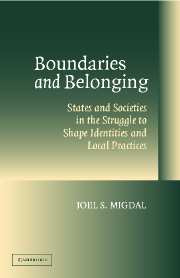 Boundaries and Belonging
Boundaries and Belonging Book contents
- Frontmatter
- Contents
- List of Contributors
- Preface and Acknowledgments
- PART I INTRODUCTION
- PART II ON THE EVE OF THE NATION-STATE: THE OTTOMAN EMPIRE
- PART III THE STATE AND “DANGEROUS POPULATIONS”
- PART IV INSCRIBING MEMBERSHIP AND CONTESTING MEMBERSHIP IN THE NATION
- 7 Challenging Boundaries and Belongings: “Mixed Blood” Allotment Disputes at the Turn of the Twentieth Century
- 8 Belonging and Not: Rossland, British Columbia, during the Great War
- 9 Boundaries and Belonging in Conditions of Extreme Politicization: The Chinese State in Private and Public Spaces, 1949–1968
- 10 Gender and the Reproduction and Maintenance of Group Boundaries: Why the “Secular” State Matters to Religious Authorities in Israel
- PART V BEYOND THE STATE: TRANSNATIONAL FORCES AND THE CHALLENGE TO THE STATE
- PART VI CONCLUSION
- Index
9 - Boundaries and Belonging in Conditions of Extreme Politicization: The Chinese State in Private and Public Spaces, 1949–1968
Published online by Cambridge University Press: 25 July 2009
- Frontmatter
- Contents
- List of Contributors
- Preface and Acknowledgments
- PART I INTRODUCTION
- PART II ON THE EVE OF THE NATION-STATE: THE OTTOMAN EMPIRE
- PART III THE STATE AND “DANGEROUS POPULATIONS”
- PART IV INSCRIBING MEMBERSHIP AND CONTESTING MEMBERSHIP IN THE NATION
- 7 Challenging Boundaries and Belongings: “Mixed Blood” Allotment Disputes at the Turn of the Twentieth Century
- 8 Belonging and Not: Rossland, British Columbia, during the Great War
- 9 Boundaries and Belonging in Conditions of Extreme Politicization: The Chinese State in Private and Public Spaces, 1949–1968
- 10 Gender and the Reproduction and Maintenance of Group Boundaries: Why the “Secular” State Matters to Religious Authorities in Israel
- PART V BEYOND THE STATE: TRANSNATIONAL FORCES AND THE CHALLENGE TO THE STATE
- PART VI CONCLUSION
- Index
Summary
Introduction
The modern state, we have come to learn, is an extremely ambitious organization, prone to deep societal penetration, territorial expansion, and boundary creations. But among modern states, or at least those that aspire to this status, few are as ambitious as those whose leaders rose to power claiming the birth of a new, revolutionary order. In revolutions, very little is sacrosanct; everything is open to debate and change. The perquisites of class, status, and privilege are rethought and sometimes radically altered, as are criteria for membership in favored and out-of-favor groups when revolutionaries go about rewarding those who supported them and punishing those who did not. In addition, the sources of authority, legitimacy, and methods of governance are reexamined in light of new understandings of what is “fair,” “right,” and “just.” Domestic and private matters, such as love, marriage, divorce, and the appropriate sexual division of labor in the family, are also reexamined. Tellingly, some of the very first pieces of legislation passed by French, Chinese, and Soviet revolutionaries dealt with marriage and the family. Methods of chronicling time itself also change. In China, for instance, the Republican revolution of 1911 renumbered all subsequent years as if 1911 was year “0”; in Taiwan the year 2004 is “92.” Conceptions and use of the state's internal space are not exempt from reevaluation, either.
- Type
- Chapter
- Information
- Boundaries and BelongingStates and Societies in the Struggle to Shape Identities and Local Practices, pp. 205 - 225Publisher: Cambridge University PressPrint publication year: 2004
- 1
- Cited by


